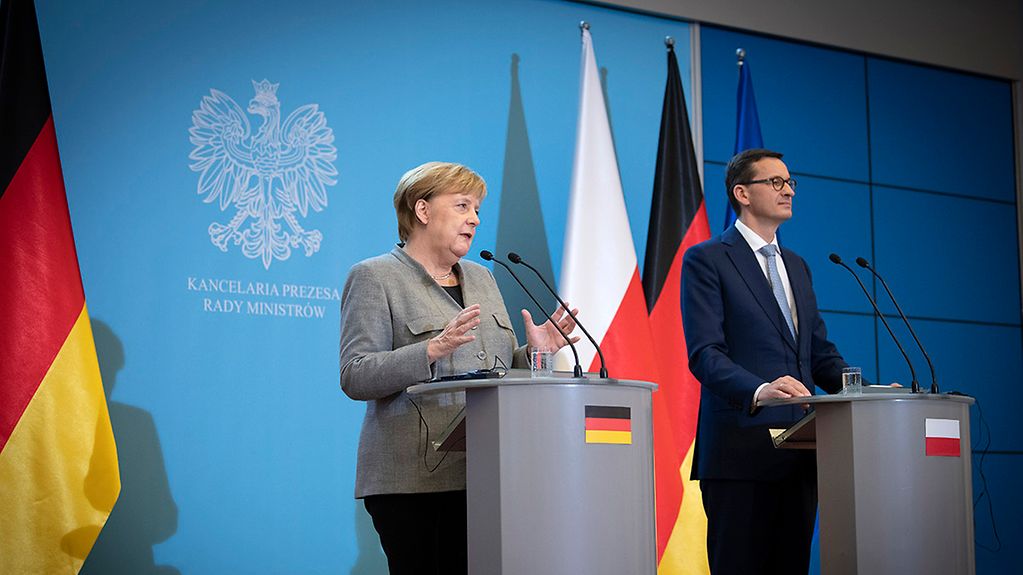German-Polish government consultations
Bilateral projects, economic issues and European matters were on the agenda of the 15th German-Polish government consultations, which Chancellor Angela Merkel and a large number of her Cabinet ministers have attended in Warsaw. In view of the fraught history of the two nations, it is "all the more important that today we are good partners in a world that is not uncomplicated," said Angela Merkel.

Where opinions diverge, differences, "can only be resolved in dialogue“, said the Chancellor
Photo: Bundesregierung/Bergmann
The government consultations took place shortly before 11 November, which marks the 100th anniversary of Poland regaining its independence. At the Presidential Palace, Prime Minister Mateusz Morawiecki welcomed Chancellor Angela Merkel with military honours. After bilateral talks, she summed up, "Working together is not only worthwhile - it benefits both sides." Where opinions diverge, these differences, "can only be resolved in dialogue".
Maintaining good partnership
At a joint press conference, the Polish Prime Minister stressed how useful the wide-ranging exchange of views is, and pointed to the "excellent, fruitful consultations" on all topical issues. The Chancellor agreed and expressed her thanks, on behalf of the entire German delegation, for the warm welcome in Warsaw. In view of the fraught history that Germany and Poland have behind them, she said "It is all the more important that today we are good partners in a world that is not uncomplicated."
On 17 June 1991 Germany and Poland signed the German-Polish Treaty on Good-Neighbourliness and Friendly Cooperation. Both countries marked the 25th anniversary with a wide range of special events mainly at civil society level.
Important trading partners
Speaking in Warsaw, the Chancellor also pointed to the excellent economic figures in both countries, where "the shortage of skilled workers is currently more of an issue than unemployment". The volume of trade, at 110 billion euros, is "considerable". This is something both countries can be very proud of, she added.
Angela Merkel thanked her Polish partners for agreeing to host the next UN Climate Change Conference, COP 24. Germany and Poland face similar problems in terms of climate change mitigation, she said, especially regarding the future role of coal and the transition to renewable and sustainable forms of energy.
Europe - a common challenge
The common wish of Poland and Germany is to agree on an orderly withdrawal from the European Union for the United Kingdom within the next few days, reported the Chancellor. Both countries want the agreement to pave the way for "good, cordial relations" with the UK in future too. Following the elections to the European Parliament in May 2019, the EU will also have to agree on the next Multi-annual Financial Framework. Angela Merkel praised the fact that Poland and other Central and Eastern European states have hitherto made "highly effective" use of funds from the Cohesion Fund, thus achieving greater convergence with the other EU states.
The Chancellor also underscored the fact that Germany cooperates well with Poland, a NATO partner, in the field of defence. There are plans, she reported, for "very close cooperation" on future arms projects including tanks. This is a sign of the shared commitment "to make Europe more efficient in this context, while remaining a good and important part of NATO, because the transatlantic partnership is important to us," said the Chancellor.
Common view towards the east
Germany, said Angela Merkel, agrees with Poland's assessment of Russia regarding the conflict in Ukraine. On the one side, progress has been made on democratising Ukraine and helping address corruption. "On the other side, however, we are unfortunately not seeing the progress we had hoped for on the implementation of the Minsk agreements". The situation is further complicated by restrictions being imposed in the Sea of Azov. "Germany and Poland still consider the situation to be extremely serious."
Angela Merkel expressed her pleasure that Poland will be hosting the next Western Balkans Summit in 2019. "The situation in the region remains fragile in many respects, and many problems must still be resolved." The EU accession prospects of these states are supported and these are to be developed further.
Focus on energy security
With a view to energy supply, the Chancellor stressed that in Germany's view, diversification is important. Germany will thus be stepping up its plans to build an LPG terminal to ensure that the country can draw on sources other than Nord Stream 2. Germany and Poland both aim to ensure that Ukraine "remains an important" transit state for gas, because this is also a factor in Ukraine's security.
Parallel to the meeting between the Chancellor and the Polish Prime Minister Mateusz Morawicki, German Cabinet ministers met with the Polish opposite numbers. The main thrust of their consultations were numerous bilateral cooperation projects.
Remembrance for a peaceful future
At the close of the consultations, the Chancellor laid a wreath at the grave of the unknown soldier. This memorial site was established after the First World War and commemorates those who fell in the fight for Poland's liberty. Angela Merkel saw this as "a very symbolic gesture", which reminds us of our shared history, which has been very troubled at times. "We have the will to shape the future in a peaceful and cordial way," said the Chancellor unequivocally.